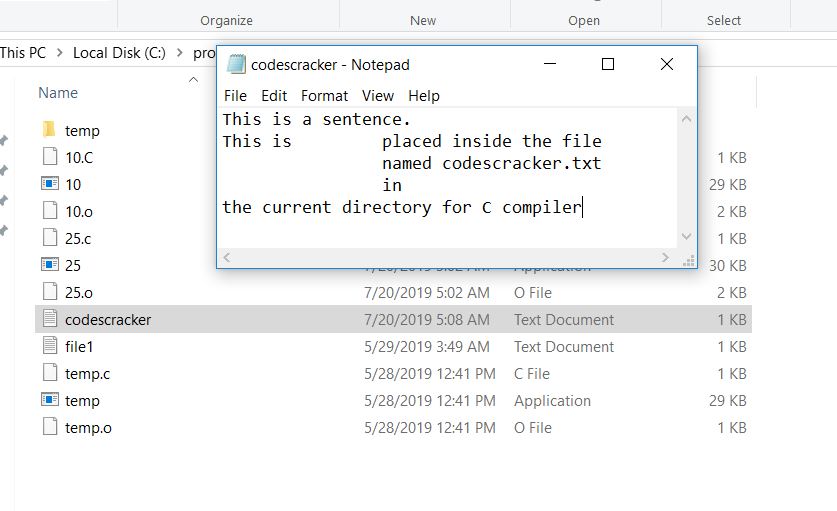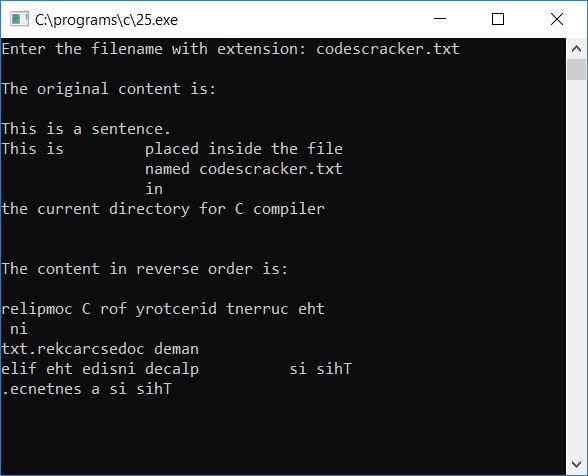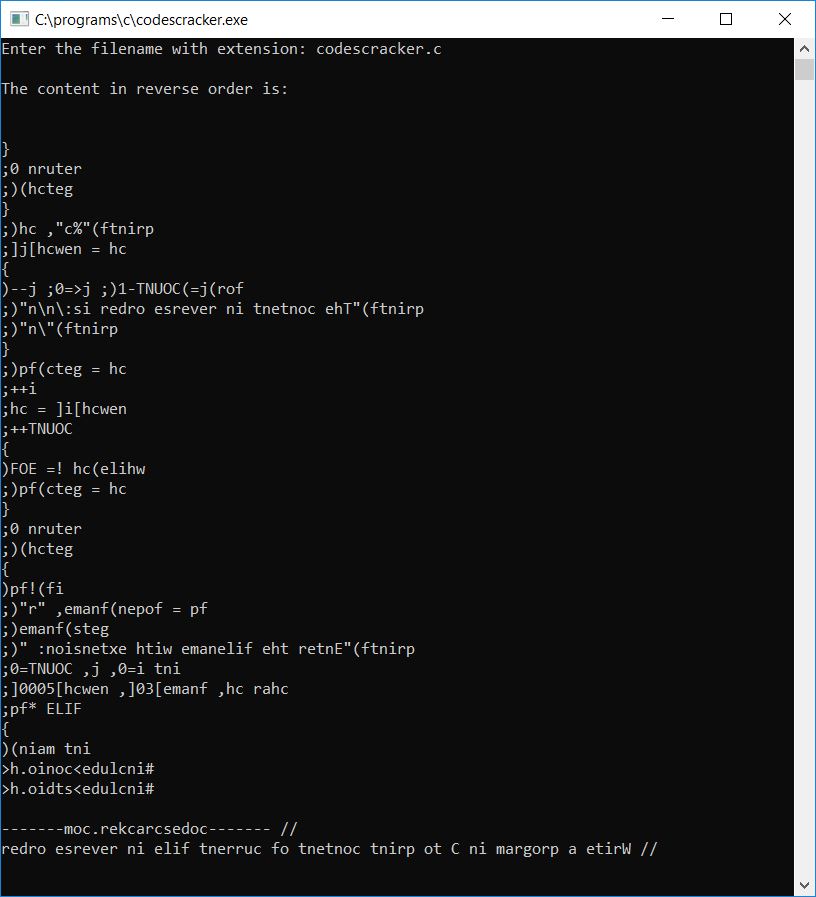- C Programming Examples
- C Programming Examples
- C Print Hello World
- C Get Input from User
- C Print Integer
- C Add Two Numbers
- C Add Subtract Multiply Divide
- C Add n Numbers
- C Area Perimeter of Square
- C Area Perimeter of Rectangle
- C Area Circum of Circle
- C Fahrenheit to Celsius
- C Celsius to Fahrenheit
- C Inches to Centimeters
- C Kilogram to Gram
- C Reverse a Number
- C Swap Two Numbers
- C Interchange Numbers
- C Print ASCII Value
- C Print Fibonacci Series
- C Check Palindrome or Not
- C Check Armstrong or Not
- C Find Armstrong Numbers
- C Find nCr and nPr
- C Find Profit Loss
- C Sum of their Square
- C First & Last Digit Sum
- C Sum of All Digit
- C Product of All Digit
- C Print Total Digit in Number
- C Check Perfect Number
- C Find Basic Gross Salary
- C Round Number to Integer
- C Print Series upto n Term
- C Find Factors of Number
- C if-else & Loop Programs
- C Check Even or Odd
- C Check Prime or Not
- C Check Alphabet or Not
- C Check Vowel or Not
- C Check Leap Year or Not
- C Is Reverse Equal Original
- C Make Calculator
- C Add Digits of Number
- Count Positive Negative Zero
- C Largest of Two Numbers
- C Largest of Three Numbers
- C Smallest of Two Numbers
- C Smallest of Three Numbers
- C Find Factorial of Number
- C Find LCM & HCF
- C Find LCM of n Numbers
- C Find HCF of n Numbers
- C Find Arithmetic Mean
- C Find Average, Percentage
- C Find Student Grade
- C Print Table of Number
- C Print Prime Numbers
- C Find Discount Purchase
- C Calculate Parcel Charge
- C Calculate Wage of Labor
- C Print Phone Bill
- C Conversion programs
- C Decimal to Binary
- C Decimal to Octal
- C Decimal to Hexadecimal
- C Binary to Decimal
- C Binary to Octal
- C Binary to Hexadecimal
- C Octal to Decimal
- C Octal to Binary
- C Octal to Hexadecimal
- C Hexadecimal to Decimal
- C Hexadecimal to Binary
- C Hexadecimal to Octal
- C Pattern Programs
- C Pattern Printing Programs
- C Print Diamond Pattern
- C Print Floyd's Triangle
- C Print Pascal's Triangle
- C Array Programs
- C 1D Array Programs
- C Linear Search
- C Binary Search
- C Largest Element in Array
- C Smallest Element in Array
- C Second Largest/Smallest
- C Count Even Odd
- C Array Element at Even
- C Array Element at Odd
- C Print Even Array Elements
- C Print Odd Array Elements
- C Sum/Product of Even/Odd
- C Reverse an Array
- C Insert Element in Array
- C Delete Element from Array
- C Merge Two Arrays
- C Bubble Sort
- C Selection Sort
- C Insertion Sort
- C Print Common Elements
- C 2D Array Programs
- C Add Two Matrices
- C Subtract Two Matrices
- C Transpose a Matrix
- C Multiply Two Matrices
- C Sum All Matrix Elements
- C Largest Element in Matrix
- C Print Row Column Total
- C 3D Array Programs
- C String Programs
- C Print String
- C Find Length of String
- C Compare Two String
- C Copy a String
- C Concatenate String
- C Reverse a String
- C Count Vowels Consonants
- C Replace Vowel in String
- C Delete Vowels from String
- C Delete Word from String
- C Frequency of Character
- C Count Word in String
- C Remove Spaces from String
- C Sort a String
- C Sort String in Alphabetical
- C Sort Words in Ascending
- C Sort Words in Descending
- C Uppercase to Lowercase
- C Lowercase to Uppercase
- C Swap Two Strings
- C Check Anagram or Not
- C Check Palindrome String
- C Print Number in Words
- C Print Successive Character
- C Character without Space
- C File Programs
- C Read a File
- C Write Content to File
- C Read & Display File
- C Copy a File
- C Merge Two Files
- C Reverse File
- C Count All Character in File
- C List Files in Directory
- C Encrypt & Decrypt a File
- C Delete a File
- C Misc Programs
- Generate Random Numbers
- C Print Date Time
- C Print Message with Time
- C Get IP Address
- C Print Smiling face
- C Pass Array to Function
- Add Two Numbers using Pointer
- C Address of Variable
- C Shutdown Computer
- C Programming Tutorial
- C Tutorial
C Program to Print the Content of a File in Reverse Order
In this article, we will learn how to create a program in C that prints the content of any given file (given by the user at run-time) in reverse order.
Things to Do Before the Program
Before creating the program that prints any file's content in reverse order, Let's first create a file with some content inside it. For example, let's write the following content in any text editor, say NotePad:
This is a sentence. This is placed inside the file named codescracker.txt in the current directory for C compiler
In the current directory, save the file with the name codescracker.txt. Here is the screenshot of the file along with its content and the folder where the file codescracker.txt is created and saved:

Print File Content in Reverse Order
The question is: write a program in C that displays the content of a file in reverse order. The filename should be entered at run-time. The answer to this question is:
#include<stdio.h> #include<conio.h> int main() { FILE *fp; char ch, fname[30], newch[500]; int i=0, j, COUNT=0; printf("Enter the filename with extension: "); gets(fname); fp = fopen(fname, "r"); if(!fp) { printf("Error in opening the file...\nExiting..."); getch(); return 0; } printf("\nThe original content is:\n\n"); ch = getc(fp); while(ch != EOF) { COUNT++; putchar(ch); newch[i] = ch; i++; ch = getc(fp); } printf("\n\n\n"); printf("The content in reverse order is:\n\n"); for(j=(COUNT-1); j>=0; j--) { ch = newch[j]; printf("%c", ch); } printf("\n"); getch(); return 0; }
The above program was written in the Code::Blocks IDE; therefore, after a successful build and run, following is the sample run.
This program will ask the user to enter any filename along with its extension that is present inside the current directory (where the above source code is saved). We've already created a file called codescracker.txt in the current directory.Therefore, we can operate on that file for practical purposes to see how the output of the above program works:

Now supply the name of the file that was created earlier, say codescracker.txt, and press the ENTER key to see the content in its original order first and then the same content in reverse order at the end of the output, as shown here:

Program Explained
- Receive the name of the file along with its extension.
- Now open the file using the "fopen()" function and initialize it to any "FILE" pointer, say "fp."
- The function "fopen()" accepts two arguments: the name of the file with its extension (that will be operated on) and the mode in which the file will be opened.
- If the file does not exist or there is any error while opening the file, print the error message and exit from the program.
- Otherwise, if the file is successfully opened, proceed to the next step in the file's operation, which is to print its content in reverse order.
- First, print the file's content in its original order.
- To do this, get the first character of the file using the "fgetc()" function, and initialize the first character to any variable, say "ch." Here the function "fgetc()" takes one argument that will be a file pointer, say "fp." Here "fp" is the file pointer of the filename entered by the user at run-time, say "codescracker.txt."
- Whenever you call "fp," the content of a file named "codescracker.txt" gets called using the pointer.
- Create a "while" loop that runs until "End-Of-File" (EOF) gets reached.
- That is, we have to apply the "while" loop's condition statement as "ch!= EOF." It states that the loop gets run until the value of "ch" gets equal to "EOF." The value of EOF is "-1."
- EOF indicates that there is nothing left inside the file, or no content left inside the file.
- Inside the "while" loop, we have a variable called "COUNT" (initialized with 0 at the start of the program) that counts the total number of characters present inside the file.
- Use the "putchar()" function to put the character on the output screen. That is, "putchar (ch)" puts the value of "ch" on the output screen.
- Now initialize the value of "ch" in an array, saying "newch[]". The indexing of this array must start with 0, therefore we have already initialized a variable, say "i," with 0 at the start of the program, and therefore we have used the "newch[i] = ch;" statement for the first time inside the "while" loop's first run. That is, at the first run of the loop, "ch" gets initialized "newch[0]" and at the second run, a new value of "ch" gets initialized to "newch[1]" and so on. Therefore, we have incremented the value of "i" after initializing the value of "ch" to initialize the next value of "ch" at the next index of the array.
- Never forget to use the "getc()" function to get the next character. Therefore, we have initialized "getc(fp)" to "ch" at the end of the loop.
- In this way, we have printed the content of the file (as it is) in its original order.
- Now create another loop ("for" loop this time) to print the content of the file in reverse order.
- Because we have an array named "newch[]" that contains all of the characters of the file (characters of the file means file content). And we have a variable named "COUNT" that holds the length of the file's content, or the total number of characters present inside the given file.
- Now to print the content of the file in reverse order, just create a "for" loop that runs from "COUNT-1" to "0."
- We have started the loop with the last index of the array.
- That is, we have printed the last character at first and the first character at last to print the file content in reverse order.
- For example, if the content of the file is "This is codescracker," then here is the list of step-by-step dry runs of the "while" loop. Here the value of
"COUNT" gets incremented each time when the program flow goes inside the loop, a character or value of "ch" gets printed each time, a character gets initialized
one by one to the array named "newch[]," the value of variable "i" gets incremented each time, and the next character gets scanned using the "ch = getc(fp);"
statement as shown in the list of dry runs given below. We have scanned the first character of the file's content using the "ch = getc(fp);" statement before
going to the "while" loop, therefore "t" gets initialized to "ch" before the first run of the "while" loop:
- At the first run of the "while" loop:
The value of "COUNT" becomes 1.
"t" gets printed on the output.
"t" gets initialized to "newch[0]"
The value of "i" becomes 1.
"h" gets initialized to "ch." - At the second run of the "while" loop:
The value of "COUNT" becomes 2.
"h" gets printed on output.
"h" gets initialized to "newch[1]"
The value of "i" becomes 2.
"i" gets initialized to "ch." - At the third run of the "while" loop:
The value of "COUNT" becomes 3.
"i" gets printed on the output.
"i" gets initialized to "newch[2]"
The value of "i" becomes 3.
"s" gets initialized to "ch." - :
- At twentieth run of the "while" loop:
The value of "COUNT" becomes 20.
"r" gets printed on the output.
"r" gets initialized to "newch[19]"
The value of "i" becomes 20.
EOF (-1) gets initialized to "ch."
- At the first run of the "while" loop:
- Therefore, to print the content of the file in reverse order, we have to print the array's content starting from the last index.
- That is, "COUNT-1" or "20-1" or "19" gets initialized to "j" (the loop variable), as "19" is greater than or equal to 0, therefore program flow goes inside the "for" loop, and "newch[j]" or "newch[19]" or "r" gets initialized to "ch." And the value of "ch" gets printed.
- In this way, all the content of the file gets printed in reverse order.
Print the contents of the current file in reverse order
If you want to print the content of the current file (to which you are writing the current program, say codescracker.c), then we have to increase the size of the array, say newch[], because the code given above may be more than 500 characters. Therefore, increase the size and make it to 5000, which is newch[5000].
Note: Never forget to save the file before running it and enter the current file name to print its content in reverse order.
Let me create a program for you to check for the current file. This program will ask the user to enter the file name and extension and will print the file in reverse order. You can enter any filename with an extension. However, we will look for the current file here.
#include<stdio.h> #include<conio.h> int main() { FILE *fp; char ch, fname[30], newch[5000]; int i=0, j, COUNT=0; printf("Enter the filename with extension: "); gets(fname); fp = fopen(fname, "r"); if(!fp) { getch(); return 0; } ch = getc(fp); while(ch != EOF) { COUNT++; newch[i] = ch; i++; ch = getc(fp); } printf("\n"); printf("The content in reverse order is:\n\n"); for(j=(COUNT-1); j>=0; j--) { ch = newch[j]; printf("%c", ch); } getch(); return 0; }
Here is the final snapshot of the sample run:

« Previous Program Next Program »